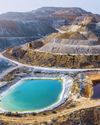How Big Data Speeds Disaster Response.

A hurricane slams a coastal city with wind, rain, and waves. People are trapped on rooftops or cut off from food and water. But roads are blocked. Cell phone calls can’t get through. Those responding to an emergency need to know where the worst damage is. This helps them quickly repair the services that keep people safe. Have three hospitals lost power, or only two? Is one of them completely destroyed? Are the fire stations operating? Which nursing home, or sewage treatment plant, is under water? And which roads and bridges are still open for delivering precious electric generators, water, and other supplies?
TIME AND PLACE
These questions are all related to geography: where things are on the Earth, what shape they’re in, and how to reach them. Maps usually help us with this, but they aren’t as straightforward as you’d think—especially after a tornado has scrambled a neighborhood or a flood has carried homes miles downstream. Now where is a building—or the person who lives there—and how do rescuers and officials find them?
The Federal Emergency Management Agency (FEMA) is in charge of directing recovery after national emergencies like the devastating 2017 hurricanes in Texas, Florida, and Puerto Rico. But FEMA also helps handle other kinds of natural disasters, like earthquakes, forest fires, and tornadoes.
When attempting to face the death and destruction these disasters cause, FEMA also has to face a data problem. Often the local people FEMA works with to make decisions are using different maps, kept in different forms. Each county tracks local properties in its own way.
Bu hikaye Muse Science Magazine for Kids dergisinin November/December 2018 sayısından alınmıştır.
Start your 7-day Magzter GOLD free trial to access thousands of curated premium stories, and 9,000+ magazines and newspapers.
Already a subscriber ? Giriş Yap
Bu hikaye Muse Science Magazine for Kids dergisinin November/December 2018 sayısından alınmıştır.
Start your 7-day Magzter GOLD free trial to access thousands of curated premium stories, and 9,000+ magazines and newspapers.
Already a subscriber? Giriş Yap

A 12-Year-Old Girl's Election Sticker Is a Winner
VOTING IS A FUNDAMENTAL FREEDOM FOR AMERICANS, A MEANS OF DOING ONE'S CIVIC DUTY AND A WAY AN INDIVIDUAL CAN EXPRESS THEIR VOICE. In 1971, the United States lowered its voting age to 18. But that doesn't mean kids and teens under 18 can't participate in elections in various ways.

If everything the human brain does is basically sets of electrical impulses, how exactly does that translate into a state of mind?
You're not the only one asking this question. Every neuroscientist in the world is wondering the exact same thing, says Zach Mainen

EARTH'S TINIEST BUILDERS
THE HIDDEN WORLD OF MICROBES IN THE EARTH'S CRUST

MUMMIES SPEAK
ABOUT MICROBES, MIGRATION, AND MORE

GOING WITH YOUR GUT
HOW DO MICROBES AFFECT OUR HEALTH? LET'S COUNT THE WAYS...

BUG Detective
A burglar sneaks into a house on a quiet street in New York City. He walks through the house, touching countertops and door handles. Finally, he steals a single card from a full deck. Then he leaves.

Little Creatures Among Us THE MANY MICROBES IN OUR DAILY LIVES
When you think you're alone, you're actually not. In the ground, the air, your room, and even your body are Strillions and trillions of creatures so tiny you can't see them.

A Mars Rock Found With Leopard Spots Could Be a Sign of Ancient Life
IN JULY, NASA'S PERSEVERANCE ROVER CAME ACROSS A SPOTTED ROCK IN WHAT WAS ONCE A RIVERBED IN THE JEZERO CRATER ON MARS.

Para Athlete Uses Exoskeleton Suit to Carry the Olympic Torch
In July, a 36-year-old French tennis para athlete, Kevin Piette, got a chance to participate in this summer’s Olympic torch relay without using a wheelchair.

Ancient Egyptians May Have Used a Water System to Lift Stones to Build Pyramid
HOW ANCIENT EGYPTIANS BUILT THE MASSIVE PYRAMIDS IN EGYPT MORE THAN 4,000 YEARS AGO HAS LONG BEEN A TOPIC OF WONDER AND DEBATE.